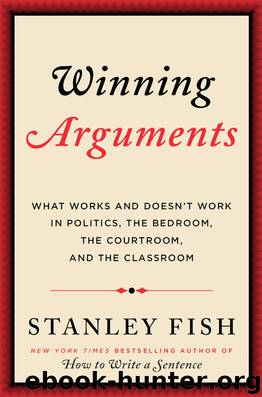Winning Arguments by Stanley Fish

Author:Stanley Fish
Language: eng
Format: epub, mobi
Publisher: HarperCollins
Published: 2016-05-26T16:00:00+00:00
CHAPTER 4
LEGAL ARGUMENTS
What You Can and Cannot Say in Court
MARITAL ARGUMENTS ERUPT when a conversation goes out of control—things being said that shouldn’t be said, molehills being made into mountains, irrelevancies that take over the landscape, piling on top of the present moment all the detritus of the past, raising voices to the point of vituperation and no return. Control or some kind of equilibrium can be restored only by the artificial and highly self-conscious strategies the manuals recommend—slowing things down, letting go of past injuries, renouncing blame, honestly assessing your own part in the dynamics of the relationship, speaking in measured, not angry, tones, putting yourself in your partner’s shoes, performing regular acts of appreciation, et cetera. In what I earlier named a bounded-argument space these controls do not have to be imposed by will because they are built into the structure of the discursive situation. In a bounded-argument space, the things one is obliged to say and the things one is forbidden to say are known in advance, either because they are set down in a list of rules or because they are part of the tacit knowledge internalized by every competent practitioner. The categories “that’s not the kind of thing we do around here” and “that’s not the kind of thing we say around here” are always in force for those in the know and are likely to be mysterious to outsiders. This is certainly the case in the law.
The September 12, 2014, edition of the New York Post reported that the judge in a murder trial reprimanded both the prosecution and defense lawyers for openly bickering and voicing sarcastic asides. Judge Solomon (a nice name for a judge) told the attorneys, “Let’s not do this in front of the jury. I said before the trial started, if you want to argue, we can argue all you want, but not in front of the jury.” A layman might think that arguments directed at a jury are exactly what goes on in court, but the opposing lawyers are not supposed to be making arguments—they are supposed to be eliciting evidence.
And not any old evidence. The evidence must be admissible and admissibility is defined by rules. It must be relevant, that is, it must bear on a disputed fact in the case; no “kitchen sink” evidence wanted. It must be material, that is, related in a strong way to the proof or disconfirmation of a specific fact at issue. If the evidence is offered on a matter requiring expert knowledge, the witness offering it must be in possession of the requisite expertise. Evidence cannot be prejudicial, that is, for example, designed to elicit outrage rather than to provide the jury with material information. It cannot be misleading, that is, tending to direct the jury’s attention to a tangential, legally irrelevant, matter. It must be direct, not hearsay, evidence; the witness cannot offer as evidence something he heard from someone else: “my aunt told me that she heard him say .
Download
This site does not store any files on its server. We only index and link to content provided by other sites. Please contact the content providers to delete copyright contents if any and email us, we'll remove relevant links or contents immediately.
Cecilia; Or, Memoirs of an Heiress — Volume 1 by Fanny Burney(31332)
Cecilia; Or, Memoirs of an Heiress — Volume 3 by Fanny Burney(30934)
Cecilia; Or, Memoirs of an Heiress — Volume 2 by Fanny Burney(30889)
The Lost Art of Listening by Michael P. Nichols(6472)
We Need to Talk by Celeste Headlee(4868)
Asking the Right Questions: A Guide to Critical Thinking by M. Neil Browne & Stuart M. Keeley(4574)
On Writing A Memoir of the Craft by Stephen King(4213)
Dialogue by Robert McKee(3582)
I Have Something to Say: Mastering the Art of Public Speaking in an Age of Disconnection by John Bowe(3516)
Pre-Suasion: A Revolutionary Way to Influence and Persuade by Robert Cialdini(3413)
Elements of Style 2017 by Richard De A'Morelli(2944)
The Book of Human Emotions by Tiffany Watt Smith(2770)
Good Humor, Bad Taste: A Sociology of the Joke by Kuipers Giselinde(2557)
Name Book, The: Over 10,000 Names--Their Meanings, Origins, and Spiritual Significance by Astoria Dorothy(2490)
Fluent Forever: How to Learn Any Language Fast and Never Forget It by Gabriel Wyner(2445)
The Grammaring Guide to English Grammar with Exercises by Péter Simon(2393)
Why I Write by George Orwell(2359)
The Art Of Deception by Kevin Mitnick(2297)
Don't Sleep, There Are Snakes by Daniel L. Everett(2216)
